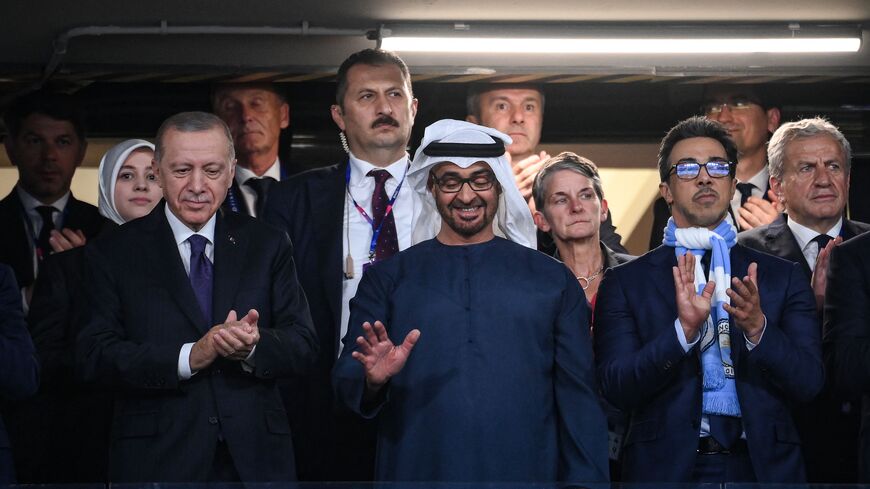Having weathered his toughest election test yet, Turkish President Recep Tayyip Erdogan has been stepping up diplomacy in the Middle East. His focus is on luring much-needed investment from the Gulf and mending fences with Egypt and Syria.
The Syrian file was high on the agenda of bilateral talks when Jordanian Foreign Minister Ayman Safadi visited Ankara on Tuesday, a day after he met with Syria’s President Bashar al-Assad and Foreign Minister Faisal Mekdad in Damascus. Ankara’s Russian-mediated bid for normalization with Damascus meshes with Jordan’s efforts to get rid of its own refugee burden, combat drug trafficking from Syria and enhance border security.
Hoping to ease Western objections to reconciliation with the Syrian government, Jordan has promoted fence-mending on the basis of reciprocity. Damascus would be expected to take steps to facilitate the return of the refugees and tackle cross-border smuggling. In May, Jordan hosted a meeting of the Arab League's contact group that paved the way for Syria’s return to the Arab League. Before his arrival in Damascus, Safadi reminded the Syrian government of its commitments agreed to in the Amman Declaration. Following the bilateral talks, both he and Mekdad stressed that the provision of critical infrastructure and guaranteeing their basic needs is the key to speeding up the return of refugees.
In its fledgling dialogue with Syria as part of four-way talks involving Russia and Iran, Turkey has similarly argued that facilitating refugee returns should be the primary issue, while Damascus has urged Ankara to withdraw its troops from Syria and stop supporting “terrorist” groups as preconditions for normalization.
To resettle returning refugees, Erdogan had suggested the construction of new settlements with international financial aid in a safe zone to be set up inside Syria along the Turkish border. But as the idea failed to garner widespread support, Turkey has made do with building new homes in areas controlled by the Turkish military, financed by Qatar and Kuwait. Progress in rapprochement with Damascus could help enhance such efforts, again with financial assistance from the Gulf.
Still, US and European sanctions remain the chief obstacles to reconstruction in Syria. Turkey and Jordan could join forces to press for broader exemptions within the scope of humanitarian relief in a bid to resolve the refugee problem, which is affecting Europe as well. Speaking after his talks in Ankara, Safadi stressed that Jordan and Turkey were on the same page regarding the refugees’ future and expressed support for Turkey’s call to create an international fund to ensure the safe and voluntary repatriation of the refugees.
Syrian efforts to further economic ties with Arab nations, primarily Saudi Arabia, have been on the rise since the country’s return to the Arab League. For now, most of those efforts have failed to translate into concrete projects and have been met with relatively mild objections from the West.
According to the pro-opposition Syria TV, Safadi told his Turkish interlocutors that Jordan was ready to host talks similar to the Astana process aimed at resolving the Syrian crisis. The alleged proposal comes after Kazakhstan’s announcement last month that it would no longer host the talks. Safadi reportedly also proposed the discussion of mechanisms to reopen Syria’s international motorways — that is, the key M4 and M5 roads.
The M5, which has connections to two border crossings between Syria and Turkey, links Syria to Jordan as well. The Syrian army restored the road’s connection to Aleppo in 2020, but reopening international motorways means the return of the control of the roads linking the M5 to the Turkish frontier and the border crossings to the Syrian government. Damascus also expects the reopening of the M4 section between Latakia and Aleppo, which runs through rebel-controlled Idlib. The reopening of the roads is being discussed as part of a plan involving Turkey’s gradual withdrawal from Syria. Before the Syrian conflict, those roads linked Turkey to the Gulf and earned Jordan economic benefits.
Jordan appears willing to play some sort of a facilitating role between Ankara and Damascus, though not as a replacement for Russian mediation. Given that the Syrian refugees have become a major issue for both Turkey and Jordan, the two countries could cooperate on pushing for the lifting of Western sanctions and clearing the way for reconstruction in Syria.
Grappling with economic turmoil at home, Erdogan is expected to visit the United Arab Emirates, Saudi Arabia and Qatar in the coming days as Ankara hopes to lure up to $25 billion in investments from the Gulf, including through privatization and acquisitions, according to Bloomberg. Erdogan apparently hopes to draw Arab funds into the home-building drive in Syria as well.
In another sign of the Arab world’s growing place in Turkey’s foreign ties, Foreign Minister Hakan Fidan held bilateral talks with his Iraqi, Kuwaiti and Algerian counterparts on the sidelines of a Non-Aligned Movement gathering in Baku this week. The Syrian foreign minister also attended the gathering.
Meanwhile, Turkey’s fence-mending with Egypt culminated in an announcement Tuesday that the two countries had nominated ambassadors to fully restore diplomatic ties after a decade-long rupture over the Muslim Brotherhood’s ouster from power in Egypt. Turkish officials said a summit between Erdogan and Egyptian President Abdel Fattah al-Sisi had been agreed on, but did not give a date. According to Turkish press reports, Sisi is expected to travel to Ankara on July 27, while Arab media outlets quoted diplomatic sources as saying that the meeting was likely to take place within two weeks.
The reconciliation process saw Ankara curb the activities of Brotherhood dissidents in Turkey to appease Cairo. On the Libyan conflict, another major point of contention, the two countries have realized that no party could pull it off unilaterally without cooperation. By making peace with Sisi, whom he had called a “putschist” and “murderer,” Erdogan hopes to ease Turkey’s isolation in disputes over energy exploration rights in the eastern Mediterranean Sea.
Cairo remains cautious, as it has been from the outset of the rapprochement. Despite the nomination of ambassadors, it has yet to greenlight the return of an array of Turkish government-linked institutions to Egypt. According to Turkish officials, talks continue on the reopening of the offices of the Anatolia News Agency, public broadcaster TRT, the Turkish Cooperation and Coordination Agency and the Yunus Emre Institute, which promotes Turkish culture abroad.
In turning new pages with Arab governments, Erdogan may be habitually following the “win-win” motto, but his moves are essentially U-turns, often underlain by the hope of plugging Turkey’s economic holes with Arab funds. New pages in conflict zones such as Syria and Libya require turnabouts as well.








